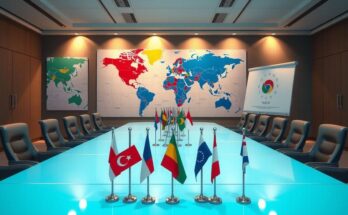Honduras’s upcoming primaries are set against a backdrop of strained U.S.-Honduran relations amid Trump’s administration policies. The political landscape includes three parties facing internal and external challenges, with concerns over electoral integrity heightened by halted U.S. support. Illicit financing and electoral violence continue to jeopardize democratic processes, necessitating stringent oversight and U.S. cooperation to protect electoral integrity.
The relationship between the United States and Honduras has encountered significant challenges, exacerbated during the Trump administration. Numerous Republican Party officials perceive President Xiomara Castro’s administration as a threat due to its ties with China and support for Nicaragua and Venezuela. In early February 2025, Secretary of State Marco Rubio’s exclusion of Honduras from his Central America tour conveyed a strong diplomatic message.
During Trump’s tenure, relations with former President Juan Orlando Hernández were supportive, but Hernández was extradited and convicted for drug trafficking in 2022. Compounding these issues, allegations emerged of electoral fraud during the 2017 elections involving Hernández. Recently, Trump advisor Roger Stone controversial claimed that Hernández was targeted for opposing Castro’s socialist government. This rhetoric raises significant concerns regarding the future of U.S.-Honduran relations, despite Castro’s commitment to uphold the extradition treaty and engage in deportation initiatives involving Venezuelan migrants.
Honduras is preparing for primary elections on March 9, where three political parties will select candidates for the general elections on November 30, 2025. The political landscape is highly polarized, involving the Liberty and Refoundation Party (LIBRE), the National Party (PN), and the Liberal Party (PL), each facing internal challenges and proposing controversial candidates.
The LIBRE has nominated Rixi Moncada, the current Defense Secretary, whose candidacy is supported by President Castro. Other candidates include Rasel Tomé, the Vice President of Congress, who faces U.S. sanctions for corruption. Conversely, the PN features Ana García, the former president’s wife, alongside other candidates burdened by corruption allegations, such as Nasry Asfura. The PL has nominated Jorge Cálix and Salvador Nasralla, who have pledged to restore ties with Taiwan.
The halt of U.S. cooperation has impacted electoral integrity, causing significant ramifications for civil society organizations aiming to monitor the electoral process. Although the Organization of American States (OAS) will send a technical team, funding for thorough election observation remains uncertain amid freezing U.S. foreign assistance. This funding disruption compromises the capacity of organizations like the International Foundation for Electoral Systems (IFES) and the National Democratic Institute (NDI), undermining efforts to uphold democratic standards.
The challenge of illicit electoral financing further complicates the integrity of elections in Honduras. Continued revelations during Hernández’s trial highlighted how drug trafficking and organized crime have infiltrated political institutions. Robust auditing of campaign financing is imperative, yet compliance with existing regulations remains alarmingly low. The Clean Politics Unit suffers from budget constraints and confidentiality issues, limiting its effectiveness in promoting transparency.
Electoral violence remains a pressing concern, with a rise in threats against electoral authorities and violence directed at candidates. The Global Peace Index rates Honduras poorly due to the pervasive influence of organized crime and internal conflicts. Criminal networks targeting resources, including Indigenous territories, exacerbate tensions and contribute to violence, as evidenced by assaults surrounding environmental protection efforts.
In summary, ensuring transparent and fair elections in Honduras is paramount. While the National Congress has allocated an electoral budget, comprehensive oversight of campaign financing and enhanced collaboration between institutions is vital. Additionally, restored U.S. support for electoral institutions is critical to safeguard electoral integrity and monitor the challenges posed by organized crime.
Free and transparent elections in Honduras must be prioritized, and the National Congress has taken steps by approving an electoral budget. Nonetheless, a concrete commitment to monitor campaign financing and improve institutional coordination is necessary. Furthermore, the United States must renew its cooperation with electoral bodies and civil society to uphold the integrity of elections, particularly against the backdrop of organized crime and political violence.
Original Source: www.wola.org




